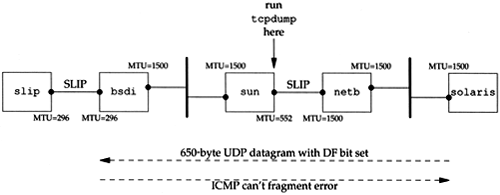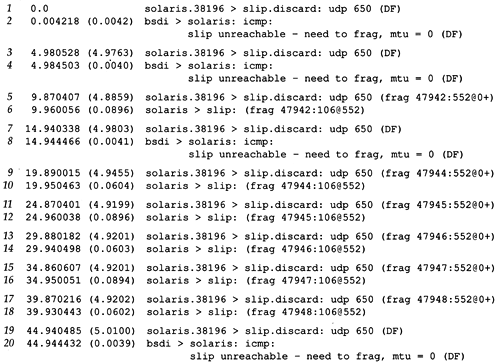11.8 Path MTU Discovery with UDP
11.8 Path MTU Discovery with UDP
Let's examine the interaction between an application using UDP and the path MTU discovery mechanism. We want to see what happens when the application writes datagrams that are too big for some intermediate link.
Example
Since the only system that we've been using that supports the path MTU discovery mechanism is Solaris 2.x, we'll use it as the source host to send 650-byte datagrams to slip. Since our host slip sits behind a SLIP link with an MTU of 296, any UDP datagram greater than 268 bytes (296 “ 20 “ 8) with the "don't fragment" bit set should cause the router bsdi to generate the ICMP "can't fragment" error. Figure 11.13 shows the topology and the MTUs.
Figure 11.13. Systems used for path MTU discovery using UDP.

The following command generates ten 650-byte UDP datagrams, with a 5-second pause between each datagram:
solaris % sock -u -i -n10 -w650 -p5 slip discard
Figure 11.14 shows the tcpdump output. When this example was run, the router bsdi was set to not return the next -hop MTU as part of the ICMP "can't fragment" error.
Figure 11.14. Path MTU discovery using UDP.

The first datagram is sent with the DF bit set (line 1) and generates the expected error from the router bsdi (line 2). What's puzzling is that the next datagram is also sent with the DF bit set (line 3) and generates the same ICMP error (line 4). We would expect this datagram to be sent with the DF bit off.
On line 5 it appears IP has finally learned that datagrams to this destination should not be sent with the DF bit set, so IP goes ahead and fragments the datagrams at the source host. This is different from earlier examples where IP sends the datagram that is passed to it by UDP and allows the router with the smaller MTU ( bsdi in this case) to do the fragmentation. Since the ICMP "can't fragment" message didn't specify the next-hop MTU, it appears that IP guesses that an MTU of 576 is OK. The first fragment (line 5) contains 544 bytes of UDP data, the 8-byte UDP header, and the 20-byte IP header, for a total IP datagram size of 572 bytes. The second fragment (line 6) contains the remaining 106 bytes of UDP data and a 20-byte IP header.
Unfortunately the next datagram, line 7, has its DF bit set, so it's discarded by bsdi and the ICMP error returned. What has happened here is that an IP timer has expired telling IP to see if the path MTU has increased by setting the DF bit again. We see this happen again on lines 19 and 20. Comparing the times on lines 7 and 19 it appears that IP turns on the DF bit, to see if the path MTU has increased, every 30 seconds.
This 30-second timer value is way too small. RFC 1191 recommends a value of 10 minutes. It can be changed by modifying the parameter ip_ire_pathmtu_interval (Section E.4). Also there is no way in Solaris 2.2 to turn off this path MTU discovery for a single UDP application or for all UDP applications. It can only be enabled or disabled on a systemwide basis by changing the parameter ip_path_mtu_discovery. As we can see from this example, enabling path MTU discovery when UDP applications write datagrams that will probably be fragmented can cause datagrams to be discarded.
The maximum datagram size assumed by the IP layer on solaris (576 bytes) is not right. In Figure 11.13 we see that the real MTU is 296 bytes. This means the fragments generated by solaris will be fragmented again by bsdi. Figure 11.15 shows the tcpdump output collected on the destination host ( slip ) for the first datagram that arrives (lines 5 and 6 from Figure 11.14).
Figure 11.15. First datagram arriving at host slip from solaris.

In this example the host solaris should not fragment the outgoing datagrams but should turn off the DF bit and let the router with the smaller MTU do the fragmentation.
Now we'll run the same example but modify the router bsdi to return the next-hop MTU in the ICMP "can't fragment" error. Figure 11.16 shows the first six lines of the tcpdump output.
Figure 11.16. Path MTU discovery using UDP.

Again, the first two datagrams are sent with the DF bit set, and both elicit the ICMP error. The ICMP error now specifies the next-hop MTU of 296.
In lines 5, 6, and 7 we see the source host perform fragmentation, similar to Figure 11.14. But knowing the next-hop MTU, only three fragments are generated, compared to the four fragments generated by the router bsdi in Figure 11.15.
EAN: 2147483647
Pages: 378